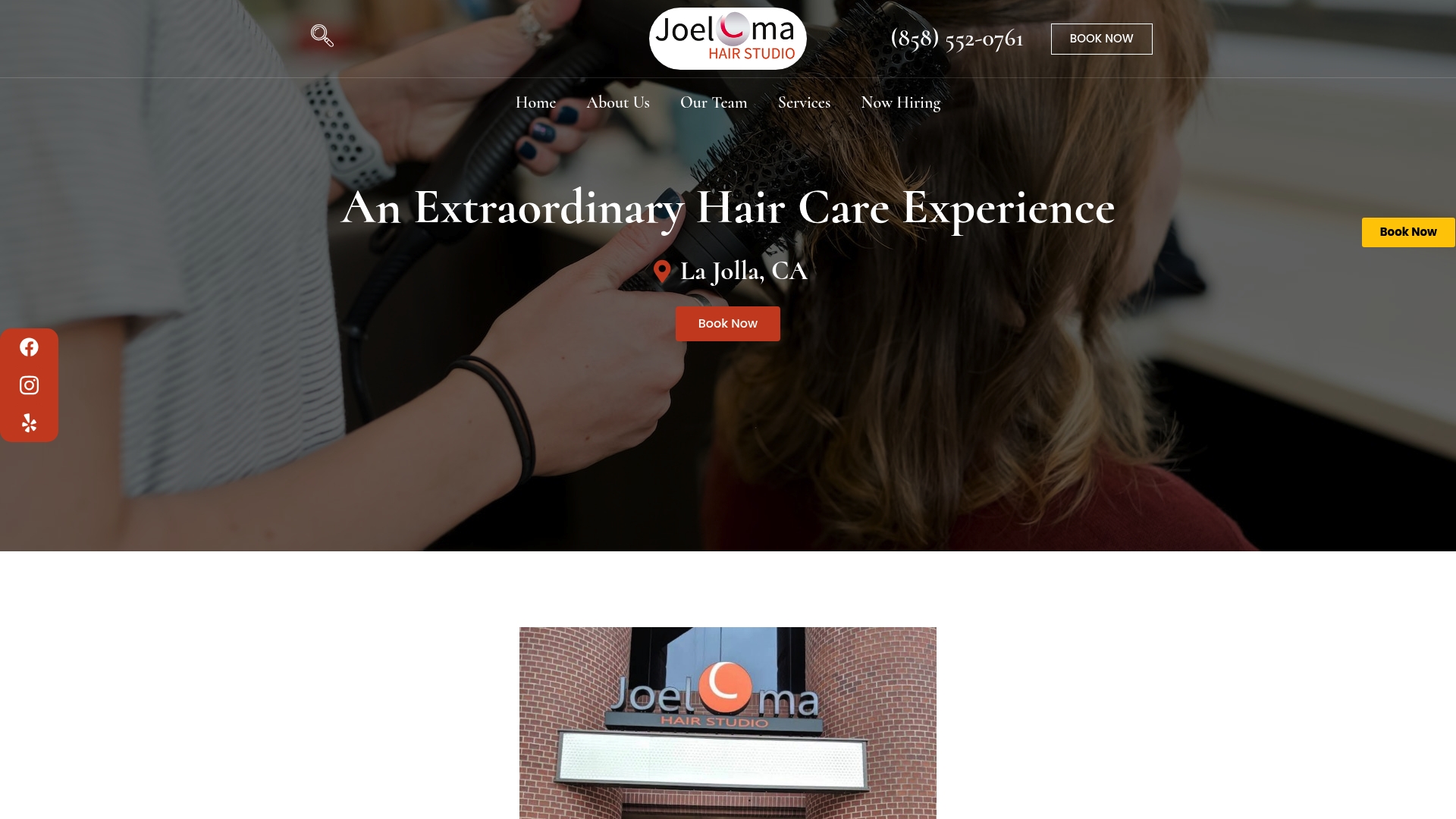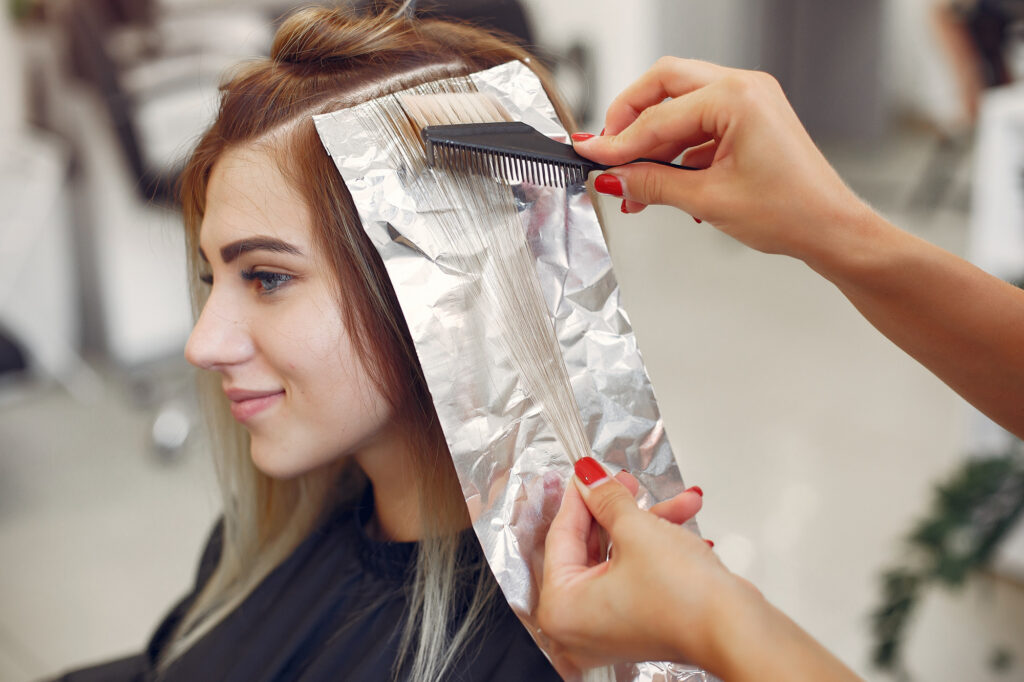Everyone wants silky, vibrant hair that turns heads in La Jolla’s sunshine. Most people reach for fancy products and pricey treatments hoping for results. Here is the shocker though. Your diet affects up to 80 percent of your hair’s strength and shine, so what you eat matters far more than any serum or salon visit. The real secret to gorgeous hair starts on your plate.
Table of Contents
- Essential Nutrients For Strong, Healthy Hair
- Best Foods To Boost Hair Growth
- Personalized Nutrition Tips For Luxe Hair Care
- Foods And Habits To Avoid For Hair Health
Quick Summary
| Takeaway | Explanation |
|---|---|
| Focus on protein intake for hair health. | Lean proteins like chicken, fish, and legumes are critical for strong hair, helping with growth and repair. |
| Include micronutrients in your diet. | Vitamins such as iron, zinc, and biotin support hair follicle health and prevent hair loss. |
| Stay hydrated for better hair quality. | Proper hydration helps transport nutrients to hair follicles and maintains scalp moisture, promoting healthier hair. |
| Avoid processed foods that harm hair. | Diets high in sugar and processed items can lead to inflammation and nutrient deficiencies affecting hair vitality. |
| Consult with professionals for personalized nutrition. | Understanding individual nutritional needs through assessments can optimize dietary choices for better hair outcomes. |
Essential Nutrients for Strong, Healthy Hair
Healthy hair starts from within, and the nutrients you consume play a critical role in maintaining vibrant, strong locks. Your hair’s appearance directly reflects your overall nutritional status, making dietary choices fundamental to achieving lustrous, resilient hair.
Protein and Amino Acids: The Building Blocks of Hair
Protein forms the core foundation of hair health. Hair is primarily composed of keratin, a protein that requires consistent nutritional support to maintain its strength and structure. According to research from the National Institutes of Health, specific nutrients are crucial for optimal hair follicle function and cellular turnover. Lean proteins such as chicken, fish, eggs, and legumes provide essential amino acids that support hair growth and repair.
Consider incorporating diverse protein sources into your diet. Salmon offers omega-3 fatty acids alongside protein, while eggs provide biotin and zinc. Plant-based proteins like quinoa and lentils can also contribute to hair health, ensuring you receive a comprehensive nutritional profile.
Micronutrients Critical for Hair Vitality
Research from the NIH Vitamin D Fact Sheet highlights the significance of specific micronutrients in maintaining hair health. Vitamins and minerals like iron, zinc, vitamin D, and biotin play pivotal roles in hair follicle development and preventing hair loss.
Iron deficiency can lead to hair shedding and weakened hair structure. Zinc supports protein synthesis and cell division in hair follicles. Vitamin D receptors are present in hair follicles, suggesting its importance in the hair growth cycle. Biotin, a B-vitamin, helps metabolize proteins essential for hair strength.
Hydration and Nutritional Balance
Beyond specific nutrients, overall dietary balance and hydration significantly impact hair health. Water helps transport nutrients to hair follicles and maintains scalp hydration. Consuming a varied diet rich in fruits, vegetables, lean proteins, and whole grains ensures your body receives comprehensive nutritional support.
Stress, hormonal changes, and dietary restrictions can impact hair quality. Consulting with a nutritionist or healthcare professional can help develop a personalized nutrition strategy tailored to your unique hair health needs. Regular blood tests can identify potential nutrient deficiencies and guide targeted dietary interventions.
Remember, healthy eating for hair is not about quick fixes but consistent, balanced nutrition. Your hair reflects your overall health, making mindful dietary choices an investment in both your appearance and well-being.
To help you quickly identify the foods that contribute to strong, healthy hair, here’s a summary table of key nutrients and their food sources mentioned in the article:
| Nutrient | Role in Hair Health | Example Food Sources |
|---|---|---|
| Protein | Builds and repairs hair (keratin structure) | Chicken, fish, eggs, legumes, tofu |
| Omega-3 | Supports scalp health and reduces inflammation | Salmon, mackerel, sardines |
| Iron | Prevents hair shedding and strengthens hair | Spinach, red meat, legumes |
| Zinc | Supports protein synthesis and cell division | Eggs, pumpkin seeds, nuts |
| Biotin | Metabolizes proteins for hair strength | Eggs, legumes, nuts |
| Vitamin D | Involved in hair growth cycle and follicle function | Eggs, salmon, sunlight |
| Vitamin E | Protects hair follicles from oxidative stress | Almonds, walnuts, sunflower seeds |
| Vitamin C | Improves iron absorption, supports scalp circulation | Dark leafy greens, fruits |
| Water | Transports nutrients and maintains scalp hydration | Water, herbal tea, watermelon, cucumber |
Best Foods to Boost Hair Growth
Transforming your hair health begins with strategic nutritional choices. The foods you consume can dramatically influence hair growth, strength, and overall appearance. Understanding which nutrients support optimal hair development allows you to create a targeted dietary approach that promotes vibrant, resilient locks.
Protein-Rich Foods for Hair Regeneration
Protein serves as the fundamental building block for hair growth. According to research published in Dermatology Practical & Conceptual, specific dietary sources can significantly impact hair follicle health. Lean protein sources like salmon, chicken, turkey, and eggs provide essential amino acids necessary for keratin production.
Fish not only offers high-quality protein but also contains omega-3 fatty acids that support scalp health. Fatty fish like mackerel and sardines deliver additional benefits, reducing inflammation and supporting hair follicle function. Plant-based protein alternatives such as lentils, quinoa, and tofu can also contribute to robust hair growth for those following vegetarian or vegan diets.
Micronutrient-Dense Foods for Hair Vitality
Micronutrients play a crucial role in hair development and maintenance. Iron-rich foods like spinach, red meat, and legumes help prevent hair loss associated with deficiencies. Dark leafy greens provide iron, while also offering vitamin C, which enhances iron absorption.
Nuts and seeds emerge as nutritional powerhouses for hair health. Almonds, walnuts, and pumpkin seeds contain zinc, selenium, and vitamin E. These nutrients support scalp circulation and protect hair follicles from oxidative stress. Sunflower seeds, for instance, provide linoleic acid, which supports hair density and prevents hair thinning.
Strategic Dietary Combinations for Maximum Hair Growth
Balancing food groups is essential for comprehensive hair nutrition. Combining protein sources with vitamin-rich vegetables creates synergistic effects that optimize hair growth. A meal combining grilled salmon with roasted sweet potatoes offers protein, omega-3 fatty acids, and beta-carotene, which converts to vitamin A and supports sebum production.
Hydration remains critical in supporting hair health. Water helps transport nutrients to hair follicles and maintains scalp moisture. Herbal teas and water-rich fruits like watermelon and cucumber can complement your daily water intake, further supporting hair growth mechanisms.
While diet plays a significant role, individual nutritional needs vary. Consulting with a nutritionist can help develop a personalized nutrition strategy tailored to your specific hair health requirements. Regular blood tests can identify potential nutrient deficiencies and guide targeted dietary interventions.
Remember, consistent nutrition is key. Hair growth is a gradual process that reflects your overall health and dietary habits. Patience and a balanced approach will yield the most sustainable and impressive results.
Personalized Nutrition Tips for Luxe Hair Care
Achieving luxurious hair requires more than a one-size-fits-all approach. Discover our expert hair care insights that transform nutritional strategies into personalized hair wellness solutions.
Understanding Individual Nutritional Profiles
Research from recent nutritional studies reveals that hair health is deeply connected to individual metabolic differences. According to a 2021 article in ‘Clinics in Dermatology’, comprehensive dietary histories can unveil critical insights into potential nutritional deficiencies affecting hair structure and vitality.
Genetic variations play a significant role in how your body processes nutrients. Some individuals might require higher zinc intake, while others need more biotin or vitamin D. Blood tests and professional nutritional assessments can map out your unique dietary requirements, enabling a targeted approach to hair nutrition.
Combating Oxidative Stress Through Strategic Nutrition
Research published in the Indian Dermatology Online Journal highlights oxidative stress as a critical factor in hair health. Antioxidant-rich foods become powerful allies in maintaining hair resilience. Berries, dark leafy greens, and foods high in vitamins A, C, and E can help neutralize cellular damage and support hair follicle strength.
Consider creating personalized meal plans that incorporate antioxidant-dense ingredients. Blueberries, spinach, nuts, and green tea offer comprehensive protection against environmental stressors that can compromise hair quality. The goal is developing a nutritional strategy that addresses your specific metabolic needs.
Tailoring Nutrition to Your Unique Hair Goals
Advanced nutritional research suggests that personalized genetic profiling can optimize dietary recommendations. A 2024 review in ‘Nutrients’ emphasizes how individual genetic differences influence dietary metabolism and subsequent hair health outcomes.
Working with nutrition experts can help develop a comprehensive approach. Factors like hormone levels, stress, age, and lifestyle all interact with nutritional intake. A holistic assessment might include metabolic testing, hormone panels, and detailed dietary analysis to create a truly customized nutrition strategy.
Consider tracking your hair’s response to dietary changes. Document texture, growth rate, and overall appearance. This personalized approach transforms nutrition from a generic concept to a precise, targeted intervention.
Remember that luxe hair care is an investment in yourself. Patience, consistency, and professional guidance are key to achieving remarkable results. Your hair tells a story of internal health, and with the right nutritional approach, you can write a narrative of vibrance and strength.

Foods and Habits to Avoid for Hair Health
While nutrition plays a crucial role in hair health, certain foods and habits can actively undermine your hair’s strength, appearance, and growth potential. Understanding these potential pitfalls is essential for maintaining luxurious, resilient locks.
Dietary Choices That Compromise Hair Quality
Not all foods support healthy hair growth. Processed foods, excessive sugar, and high-glycemic carbohydrates can negatively impact your hair’s vitality. According to Harvard Health, specific nutritional imbalances can directly affect hair and skin health.
Highly processed foods often lack essential nutrients while introducing inflammatory compounds that can disrupt hair follicle function. Refined sugars cause rapid blood sugar spikes, potentially triggering hormonal imbalances that contribute to hair thinning. Minimize consumption of sugary snacks, white bread, and packaged foods that offer minimal nutritional value.
Alcohol and excessive caffeine can also dehydrate your body, reducing the moisture available to hair follicles. These substances interfere with nutrient absorption and can lead to brittle, weak hair strands. Moderation is key to preventing nutritional deficiencies that compromise hair health.
Harmful Hair Care Practices
The U.S. Department of Health and Human Services warns against excessive heat styling and harsh chemical treatments. Frequent use of hairdryers, flat irons, and curling tools can cause significant damage, leading to dryness, breakage, and long-term hair deterioration.
Chemical treatments like frequent bleaching, permanent coloring, and aggressive straightening can weaken hair’s protein structure. These processes strip natural oils and compromise the hair’s protective barrier. If you choose to use such treatments, work with professional stylists who can minimize potential damage and recommend protective strategies.
Hygiene and Environmental Factors
The Centers for Disease Control and Prevention emphasizes the importance of proper scalp hygiene. Infrequent washing can lead to product buildup, scalp irritation, and potential infections that impede healthy hair growth.
Environmental stressors like prolonged sun exposure, chlorine, and air pollution can also damage hair. UV rays break down hair proteins, while chlorine and environmental pollutants can cause oxidative stress. Protect your hair by wearing hats, using leave-in conditioners with UV protection, and thoroughly rinsing after swimming.
Stress, lack of sleep, and inconsistent nutrition can further compromise hair health. Chronic stress disrupts hormonal balance and can trigger conditions like telogen effluvium, where hair prematurely enters a resting phase.
Remember, healthy hair is a reflection of overall wellness. By avoiding harmful foods, minimizing damaging styling practices, and protecting your hair from environmental stressors, you can maintain vibrant, strong hair that reflects your commitment to personal care.
To clarify which habits and practices benefit or hinder hair health, the following table summarizes foods and behaviors to seek out and avoid, as discussed in the article:
| Factor | Supportive for Hair | Harmful for Hair | Notes |
|---|---|---|---|
| Lean proteins | ✓ | Essential for growth and repair | |
| Omega-3 rich fish | ✓ | Reduces inflammation, supports scalp health | |
| Iron-rich greens & legumes | ✓ | Prevents hair loss from deficiency | |
| Antioxidant-rich foods | ✓ | Helps combat oxidative stress | |
| Processed foods | ✓ | Lacks nutrients, increases inflammation | |
| Excess sugar/high glycemic | ✓ | Causes hormone imbalances, impairs hair quality | |
| Excessive alcohol/caffeine | ✓ | Dehydrates body, interferes with nutrient absorption | |
| Heat/chemical styling | ✓ | Damages hair structure, causes breakage | |
| Infrequent scalp washing | ✓ | Leads to buildup and irritation, hinders healthy growth | |
| Environmental protection | ✓ | Reduces UV, pollutant, chlorine-induced damage |

Frequently Asked Questions
What are the best nutrients for healthy hair?
The best nutrients for healthy hair include protein, omega-3 fatty acids, vitamins like biotin and vitamin D, and minerals such as iron and zinc. These nutrients support hair growth, strength, and overall vitality.
How does hydration affect hair health?
Proper hydration is crucial for hair health as it helps transport nutrients to hair follicles and maintains scalp moisture. Staying hydrated can prevent dryness and promote shinier, healthier hair.
Which foods should I avoid for better hair quality?
To maintain good hair quality, avoid processed foods, excessive sugar, and high-glycemic carbohydrates. These can cause inflammation and nutrient deficiencies, negatively impacting hair health.
How can I personalize my diet for optimal hair health?
Personalizing your diet for optimal hair health involves understanding your nutritional needs, considering factors like genetics and lifestyle. Consulting with a nutritionist can help you create a tailored meal plan that addresses your unique hair health goals.
Transform Nutrition Knowledge Into Luxurious Hair Results in La Jolla
You have learned how essential nutrition is for achieving strong, shiny hair. But what if your tailored eating plan could work hand in hand with true salon expertise? Many people in La Jolla focus on healthy eating for hair, yet still struggle to get those salon-quality results. Diet alone often cannot deliver the artistic cuts, rich color, and professional insight you need for a truly head-turning look. At Joel C Ma Hair Studio, our team understands how to make the most of your internal wellness and create an outer style that reflects your vibrant, nourished hair from root to tip. We blend advanced hair artistry with a deep respect for personal care, offering services designed to elevate your natural beauty. Ready to take the next step from nutrition to style perfection?

Book your personalized consultation now at Joel C Ma Hair Studio and unlock the full potential of your healthy hair journey. Discover our expert services and see real client stories of transformation. Healthy eating gets you started. Let us help you finish the journey. Visit joelcma.com to reserve your luxury hair experience before our limited appointments fill up.





